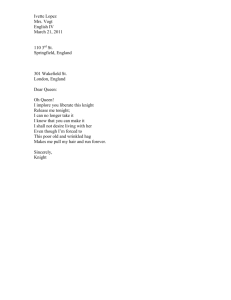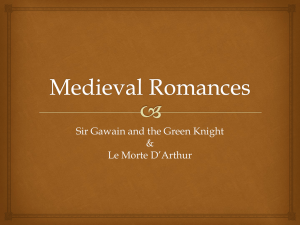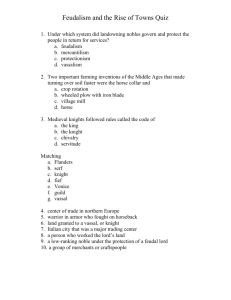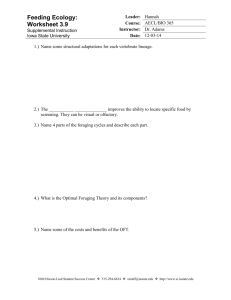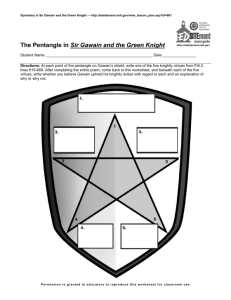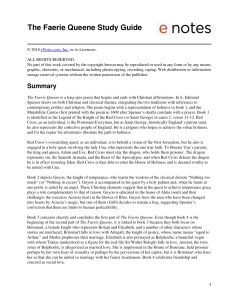EN1210 UNIVERSITY OF WARWICK Summer Examinations 2014
advertisement
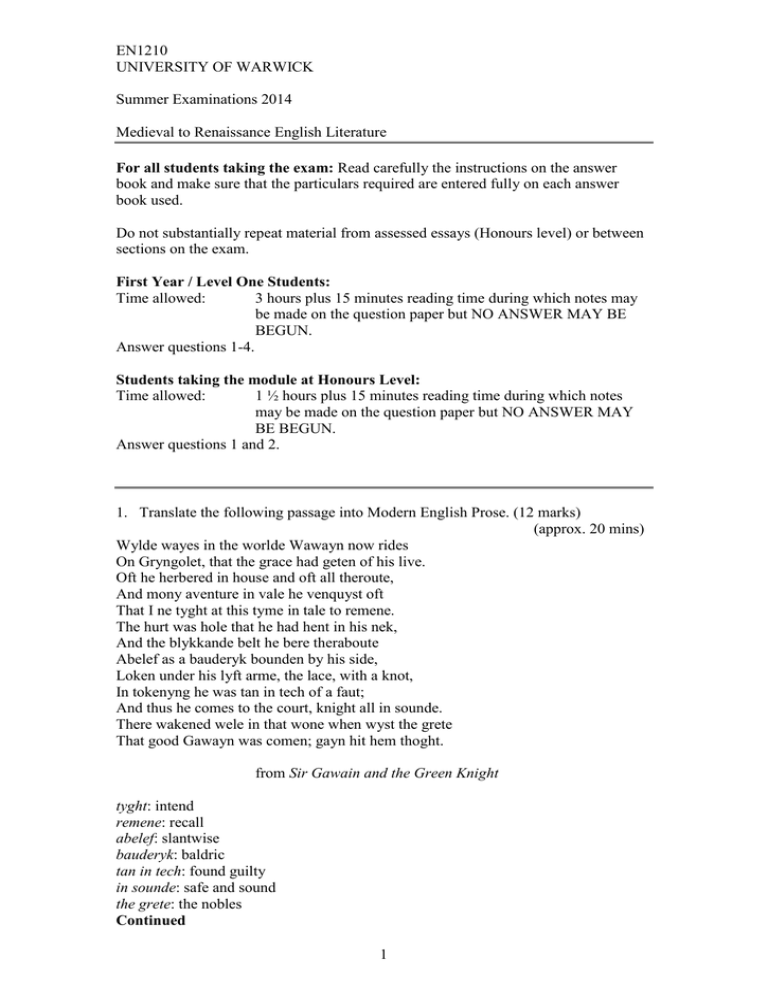
EN1210 UNIVERSITY OF WARWICK Summer Examinations 2014 Medieval to Renaissance English Literature For all students taking the exam: Read carefully the instructions on the answer book and make sure that the particulars required are entered fully on each answer book used. Do not substantially repeat material from assessed essays (Honours level) or between sections on the exam. First Year / Level One Students: Time allowed: 3 hours plus 15 minutes reading time during which notes may be made on the question paper but NO ANSWER MAY BE BEGUN. Answer questions 1-4. Students taking the module at Honours Level: Time allowed: 1 ½ hours plus 15 minutes reading time during which notes may be made on the question paper but NO ANSWER MAY BE BEGUN. Answer questions 1 and 2. 1. Translate the following passage into Modern English Prose. (12 marks) (approx. 20 mins) Wylde wayes in the worlde Wawayn now rides On Gryngolet, that the grace had geten of his live. Oft he herbered in house and oft all theroute, And mony aventure in vale he venquyst oft That I ne tyght at this tyme in tale to remene. The hurt was hole that he had hent in his nek, And the blykkande belt he bere theraboute Abelef as a bauderyk bounden by his side, Loken under his lyft arme, the lace, with a knot, In tokenyng he was tan in tech of a faut; And thus he comes to the court, knight all in sounde. There wakened wele in that wone when wyst the grete That good Gawayn was comen; gayn hit hem thoght. from Sir Gawain and the Green Knight tyght: intend remene: recall abelef: slantwise bauderyk: baldric tan in tech: found guilty in sounde: safe and sound the grete: the nobles Continued 1 EN1210 Continued 2. Write a critical commentary on ONE of the following passages. (24 marks) (approx. 40 mins) a) “Thow seyst that droppyng houses, and eek smoke, And chidyng wyves maken men to flee Out of hir owene houses; a, benedicitee! What eyleth swich an old man for to chide? Thow seyst we wyves wol oure vices hide Til we be fast, and thanne we wol hem shewe – Wel may that be a proverbe of a shrewe! Thow seist that oxen, asses, hors, and houndes, They been assayed at diverse stoundes; Bacyns, lavours, er that men hem bye, Spoones and stooles, and al swich housbondrye, And so been pottes, clothes, and array; But folk of wyves maken noon assay, Til they be wedded – olde dotard shrewe! – And thanne, seistow, we wol oure vices shewe. Thow seist also that it displeseth me But if that thou wolt preyse my beautee, And but thou poure alwey upon my face, And clepe me ‘faire dame’ in every place. And but thou make a feeste on thilke day That I was born, and make me fressh and gay; And but thou do to my norice honour, And to my chamberere withinne my bour, And to my fadres folk and his allyes – Thus seistow, olde barel-ful of lyes!” from Chaucer, Wife of Bath’s Prologue, The Canterbury Tales droppyng: leaking fast: securely tied (in marriage) assayed: tried out stoundes: times poure: gaze intently norice: nurse chamberere: chamber maid b) My Poins, I cannot frame my tune to feign, To cloak the truth for praise, without desert, Of them that list all vice for to retain. I cannot honour them that sets their part With Venus and Bacchus all their life long, Nor hold my peace of them although I smart. I cannot crouch nor kneel nor do so great a wrong To worship them like God on earth alone That are as wolves these sely lambs among. Continued 2 EN1210 Continued I cannot with my words complain and moan And suffer naught, nor smart without complaint, Nor turn the word that from my mouth is gone; I cannot speak and look like a saint, Use wiles for wit and make deceit a pleasure, And call craft counsel, for profit still to paint; I cannot wrest the law to fill the coffer, With innocent blood to feed myself fat, And do most hurt where most help I offer. I am not he that can allow the state Of high Caesar and damn Cato to die, That with his death did ’scape out of the gate From Caesar’s hands, if Livy do not lie, And would not live where liberty was lost, So did his heart the common weal apply. I am not he such eloquence to boast To make the crow singing as the swan, Nor call the lion of coward beasts the most, That cannot take a mouse as the cat can; And he that dieth for hunger of the gold Call him Alexander, and say that Pan Passeth Apollo in music many fold; Praise Sir Thopas for a noble tale, And scorn the story that the Knight told; Praise him for counsel that is drunk of ale; Grin when he laugheth that beareth all the sway, Frown when he frowneth and groan when he is pale; On others’ lust to hang both night and day – None of these points would ever frame in me; My wit is naught: I cannot learn the way. Thomas Wyatt, Mine own John Poins, ll. 19-57 list: desire sely: innocent wit: wisdom, intellect paint: deceive allow the state: approve of the exaltation. Cato: A Roman patriot who committed suicide rather than submit to Caesar. Livy: A Roman historian. Alexander: Alexander the Great. Pan: A nature god. His music was inferior to that of the god Apollo. passeth: surpasses Continued 3 EN1210 Continued c) 27 Because I oft, in dark abstracted guise, Seem most alone in greatest company, With dearth of words, or answers quite awry, To them that would make speech of speech arise, They deem, and of their doom the rumour flies, That poison foul of bubbling pride doth lie So in my swelling breast that only I Fawn on myself, and others do despise: Yet pride I think doth not my soul possess, Which looks too oft in his unflatt’ring glass; But one worse fault, ambition, I confess, That makes me oft my best friends overpass, Unseen, unheard, while thought to highest place Bends all his powers, even unto Stella’s grace. 28 You that with allegory’s curious frame Of others’ children changelings use to make, With me those pains for God’s sake do not take: I list not dig so deep for brazen fame. When I say Stella, I do mean the same Princess of beauty for whose only sake The reins of love I love, though never slake, And joy therein, though nations count it shame. I beg no subject to use eloquence, Nor in hid ways to guide philosophy; Look at my hands for no such quintessence, But know that I in pure simplicity Breathe out the flames which burn within my heart, Love only reading unto me this art. Philip Sidney, Astrophil and Stella, sonnets 27 and 28 doom: judgement glass: mirror overpass: pass by use to make: are accustomed to make I list not: I do not care to slake: slack I beg no subject to use eloquence: I do not ask for a topic as an excuse to display my rhetorical skills quintessence: the elusive ‘fifth element’ sought by alchemists Continued 4 EN1210 Continued d) Thus well instructed, to their worke they hast And comming where the knight in slomber lay The one upon his hardy head him plast, And made him dreame of loves and lustfull play, That nigh his manly hart did melt away, Bathèd in wanton blis and wicked joy: Then seemèd him his Lady by him lay, And to him playnd, how that false wingèd boy Her chast hart had subdewd, to learn Dame pleasures toy. And she her selfe of beautie soveraigne Queene, Faire Venus seemde unto his bed to bring Her, whom he waking evermore did weene To be the chastest flowre, that ay did spring On earthly braunch, the daughter of a king, Now a loose Leman to vile service bound: And eke the Graces seemèd all to sing, Hymen iô Hymen, dauncing all around, Whilst freshest Flora her with Yvie girlond crownd. In this great passion of unwonted lust, Or wonted feare of doing ought amis, He started up, as seeming to mistrust Some secret ill, or hidden foe of his: Lo there before his face his Lady is, Under blake stole hyding her bayted hooke, And as halfe blushing offred him to kis, With gentle blandishment and lovely looke, Most like that virgin true, which for her knight him took. From Spenser, The Faerie Queene, Book 1, Canto 1. plast: placed wingèd boy: Cupid toy: lustful play Leman: paramour Graces: classical personifications of grace and beauty Hymen: classical god of marriage Flora: classical goddess of spring lovely: loving 3. Write an essay in answer to ONE of the following questions (32 marks) (1 hour) Do NOT write an answer on a text on which you have already commented in question 2. a) Examine the presence and role of doubled identities in Sir Gawain and the Green Knight. Continued 5 EN1210 Continued b) What is the relation between Christian and aristocratic values in Sir Gawain and the Green Knight? c) Compare the representation of marriage in The Miller’s Tale and The Merchant’s Tale, in Chaucer’s Canterbury Tales. d) Compare the Wife of Bath and the Pardoner as biblical interpreters and exponents in Chaucer’s Canterbury Tales. 4. Write an essay in answer to ONE of the following questions (32 marks) (1 hour) Do NOT write an answer on a text on which you have already commented in question 2. a) How does More satirise European institutions in Utopia? b) ‘I have seen them gentle, tame and meek That now are wild...’ (They Flee from Me) Does Wyatt prefer the tame or the wild? c) Sidney stated that ‘it is that feigning notable images of virtues, vices, or what else, with that delightful teaching, which must be the right describing note to know a poet by’ (Defence of Poesy). Is Sidney right? Your answer may make use of the Defence and of any sixteenth-century poetry which you have read. d) Spenser wrote of his Faerie Queene: ‘To some I know this method will seem displeasaunt, which had rather have good discipline [i.e. teaching] delivered plainly in way of precepts, or sermoned at large, ... than thus cloudily enwrapped in allegorical devices’. Why does Spenser use allegory in his poem? e) What is the role of humour in EITHER Venus and Adonis OR Hero and Leander? What do Shakespeare or Marlowe take seriously in these poems? END 6
